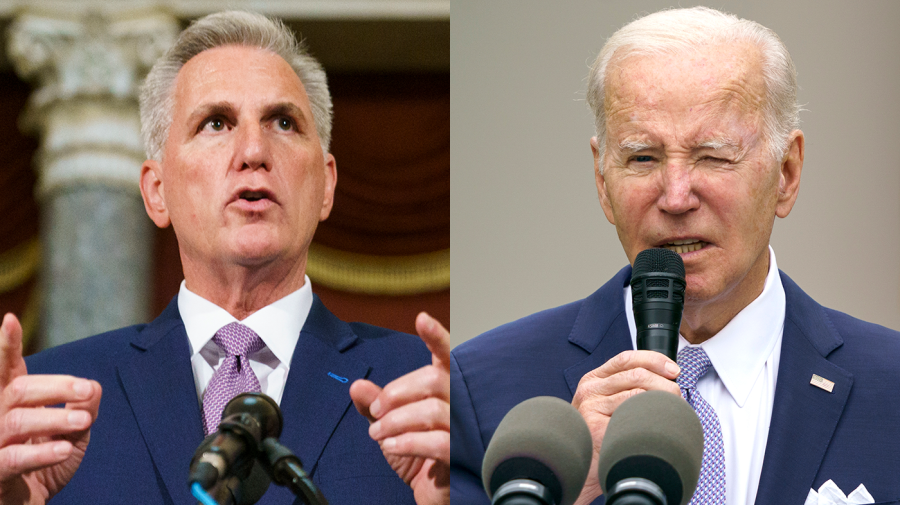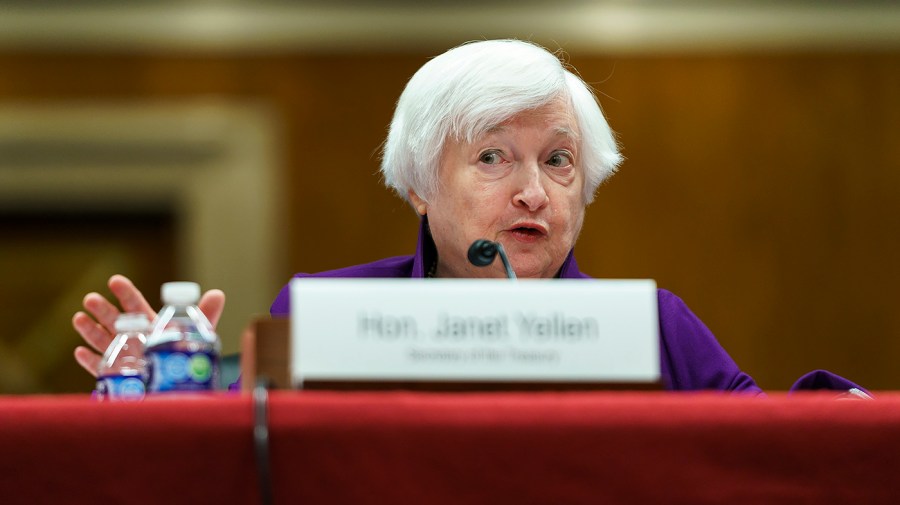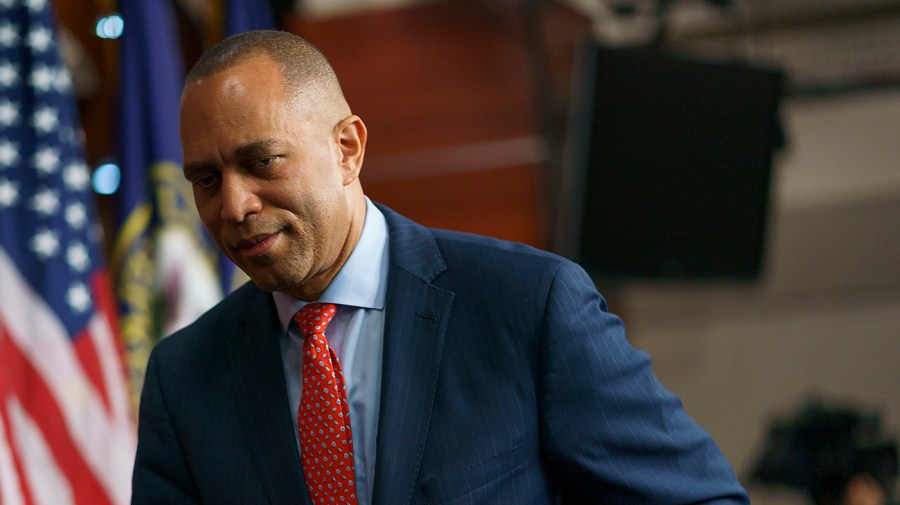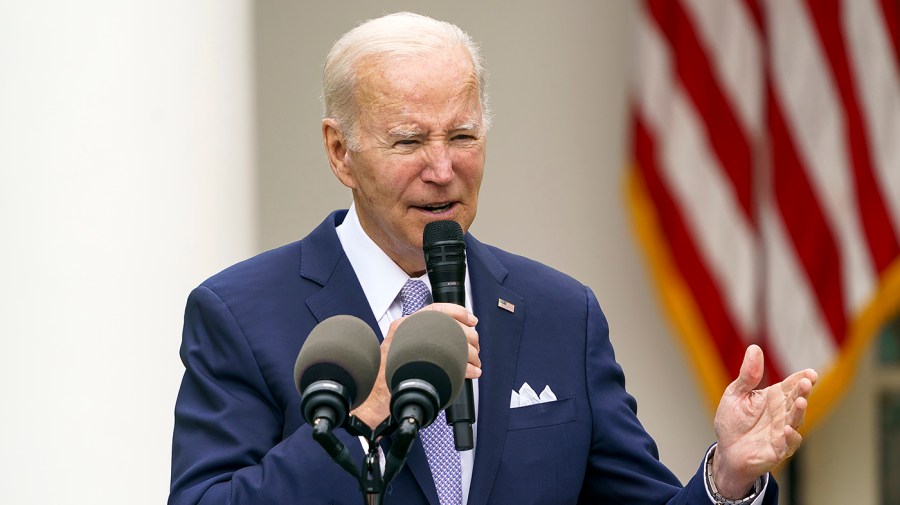Five potential outcomes of debt ceiling battle
Washington policymakers are scurrying this week to break the months-long stalemate over a debt limit hike, facing an increasingly tight deadline for finding an elusive bipartisan deal to lift the Treasury’s borrowing cap and prevent a government default.
President Biden will host a pivotal meeting with congressional leaders Tuesday at the White House, which is expected to set the tenor of the talks and provide some gauge as to whether an agreement is possible before the default deadline, which could arrive as soon as June 1.
With neither side ceding an inch, markets are getting jittery, outside experts are chiming in with increasingly novel solutions and even veteran members of Congress are weighing contingency plans to prevent an unprecedented U.S. default.
“I think everything’s on the table at this point,” Rep. Patrick McHenry (R-N.C.), the chair of the House Financial Services Committee and a close ally of Speaker Kevin McCarthy (R-Calif.), told CBS on Sunday.
Here are five potential outcomes of the high-stakes debate.
Deal!

Biden and McCarthy could strike a ninth-inning deal, though that possibility is becoming increasingly unlikely as the two leaders dig in on their contrasting stances.
Republicans have insisted that any debt limit increase be accompanied by sharp spending cuts and major policy reforms.
Democrats and Biden have said they are willing to discuss deficit spending as part of the annual appropriations process but will not negotiate over the debt limit — which they say would be holding it “hostage.”
If Republicans agree to hash out spending separately from the debt limit, however, they lose the key to their leverage: the risk of default.
Both sides will hope to walk away from Tuesday with a deal they can claim is a victory.
“Everybody should just try to take a win altogether. That’s what I’m waiting to see,” Rep. Marjorie Taylor Greene (R-Ga.) said.
One possible escape hatch to a deal is getting Biden to commit to some form of long-term deficit reduction, perhaps in the form of an outside commission aimed at reining in government spending and reducing the debt, as was proposed in a recent plan floated by the bipartisan Problem Solvers Caucus.
It remains unclear, however, if either party would get behind such a deal.
A short-term punt

Treasury Secretary Janet Yellen surprised Washington last week when she warned that the Treasury’s X-date — the day when the department would exhaust the “extraordinary” steps it’s taking to prevent a default — could arrive as soon as June 1.
That prompted Biden to call Tuesday’s White House meeting, while also raising the odds that the parties would be forced to adopt a short-term patch to prevent a default and buy negotiators more time.
David Wessel, director of the Hutchins Center on Fiscal and Monetary Policy at the Brookings Institution, suggested a logical stopgap would run through the end of the fiscal year, Sept. 30, thereby aligning the debt limit deadline with that for funding the government into fiscal 2024 — the very area where Biden has agreed to negotiate the deficit reduction Republicans are demanding.
“Then, everything gets resolved in September, but each side can describe the arrangement as it suits them,” Wessel said.
The challenge facing McCarthy, he added, is how to win Republican support for an earlier debt limit extension, even a short-term one, that would likely exclude the host of spending cuts conservatives are demanding.
Across the aisle, Democrats are also balking at the concept, which could force Biden to negotiate something he’s long rejected: spending cuts as part of the debt limit hike.
“I don’t think the responsible thing to do is to kick the can down the road,” House Minority Leader Hakeem Jeffries (D-N.Y.) said Sunday on NBC’s “Meet the Press.”
Discharge petition

House Democrats earlier this month revealed a “break-the-glass strategy” to circumvent Republican leadership and pass a debt ceiling increase — but it faces slim odds.
The procedural tactic, known as a discharge petition, would force a vote on legislation — even over the Speaker’s objection — if the measure has support from a majority of the House chamber. Only two discharge petitions have received 218 signatures since 1995: one in 2002, and the other in 2015, according to the Congressional Research Service.
Assuming all Democrats are on board, the caucus would need to pick off at least five GOP lawmakers — and some Republicans from Biden-won districts are already signaling that they cannot be counted on.
“Throughout this discussion, I have had three parameters: The President must negotiate with the Speaker, we must cut spending and we cannot default. Nothing has changed,” Rep. Mike Lawler (R-N.Y.) said. “The President and Senator Schumer must negotiate — refusing to do so is putting the full faith and credit of our nation at risk.”
The Democrats’ plan has been in the works since January, when Rep. Mark DeSaulnier (D-Calif.) introduced a bill that will serve as the legislative vehicle for the effort.
The scheme became public earlier this month, when Rep. Jim McGovern (Mass.), the top Democrat on the Rules Committee, introduced a “special rule” to start the process of bringing the measure to the floor.
The next step in the operation is filing the discharge petition and gathering signatures, which can take place May 16 at the earliest.
Biden acts alone

Some experts are floating the idea that Biden could sidestep Congress and act unilaterally to stave off an economy-wrecking default. And one proposal, in particular, has emerged as the top option of the go-it-alone strategy: the 14th Amendment, which has reportedly been discussed by officials in the White House.
While the 14th Amendment deals primarily with granting citizenship to former slaves, one section stipulates that “the validity of the public debt of the United States … shall not be questioned.” That clause has led to arguments that Congress’s move to adopt the debt ceiling more than a century ago was inherently unconstitutional, since it potentially prevents the Treasury Department from meeting its 14th Amendment obligations.
Others are urging Biden to simply ignore the statutory borrowing cap and continue paying the country’s bills, since it was Congress that already approved the spending.
“The right question is whether Congress — after passing the spending bills that created these debts in the first place — can invoke an arbitrary dollar limit to force the president and his administration to do its bidding,” Laurence Tribe, a longtime constitutional scholar at Harvard Law School, wrote recently in the New York Times. “There is only one right answer to that question, and it is no.”
A third option would have the Treasury Department mint platinum coins of some massive denomination — $1 trillion is a typical proposal — and deposit them with the Federal Reserve to allow the government to continue paying its obligations even without congressional action.
All three proposals, however, appear highly unlikely — at least so far.
“There is no way to protect our financial system and our economy other than Congress doing its job and raising the debt ceiling and enabling us to pay our bills,” Yellen said Sunday on ABC News’s “This Week.”
“We should not get to the point where we need to consider whether the president can go on issuing debt. This would be a constitutional crisis.”
Default

If both sides fail to reach a deal before the so-called “drop-dead date,” the country will default on its loans for the first time in American history.
While some Republicans have downplayed the economic consequences of such an event, a much larger group of finance experts have warned that a default would be catastrophic, leading to a stock market freefall, delays in federal benefit payments and an increase in interest rates that would reverberate through the global economy.
“It’s widely agreed that financial and economic chaos would ensue,” Yellen said Sunday when asked about what will happen if the debt limit is not raised.
“U.S. Treasury securities are the safest bedrock security underlying the global financial system. A failure of the United States to honor all of its debt would call into question our credit worthiness. Even as we get very close to this date, if Congress doesn’t act, we’re likely to see financial market consequences,” she added.
Lawmakers have also cautioned that a default could damage the U.S.’s image on the world stage. Rep. Jim Himes (Conn.), the top Democrat on the House Intelligence Committee, predicted that Russia and China “would seek to exploit” a U.S. default.
“Frankly, the full faith and credit of the United States is the bedrock on which the global financial system is built. And if that comes into question, all kinds of things could happen,” Himes told CNN’s “State of the Union.”
Copyright 2023 Nexstar Media Inc. All rights reserved. This material may not be published, broadcast, rewritten, or redistributed. Regular the hill posts








